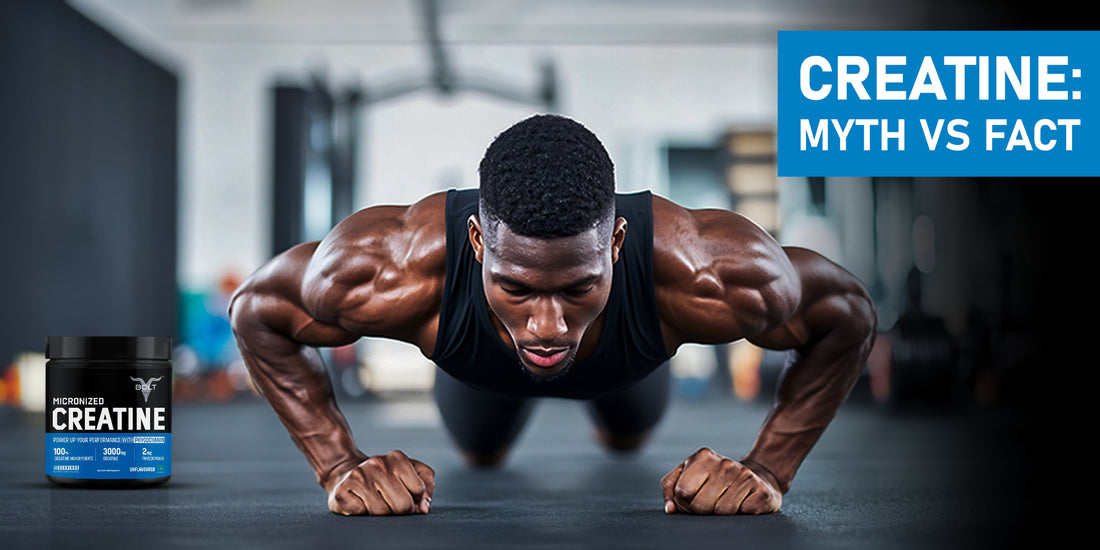
Creatine: Myths vs. Facts
byCreatine is among the most prevalent and extensively utilized supplements in the fitness industry. Nevertheless, its widespread use has led to numerous misconceptions and myths. In this discussion, we will address some of the most common questions and clarify any misunderstandings regarding creatine supplementation.
What Are the Misconceptions About Creatine?
Creatine has been around for decades, and with its long history in sports nutrition, it has been the subject of numerous rumours. Often, misconceptions arise from a lack of understanding about how creatine works in the body. Additionally, the information is sometimes distorted by misinformation from unqualified sources, leading to confusion. The reality is that creatine is a well-researched, safe supplement when used correctly.
1. Does Creatine Lead Weight Gain or Fat Gain?
Weight gain attributed to creatine is often misunderstood. The initial increase experienced by users is largely due to water retention within muscle cells rather than an accumulation of fat. Over time, consistent creatine intake combined with resistance training shifts the weight gain trajectory towards increased lean muscle mass, rather than fat.
2. Is Creatine Considered a Steroid?
No, creatine is not a steroid. It’s a naturally occurring compound found in small amounts in foods like red meat and fish. It helps supply energy to muscle cells during high-intensity exercise. Unlike steroids, which are synthetic substances designed to mimic testosterone, creatine has no hormonal effects on the body. It doesn’t alter testosterone levels or impact muscle growth in the same way steroids do.
3. Is Creatine Supplementation Harmful to the Kidneys?
There is no strong evidence to suggest that creatine supplementation damages the kidneys in healthy individuals. Creatine is processed by the kidneys, but studies have shown that it doesn’t cause harm to kidney function in those with normal kidney health. However, if you have pre-existing kidney issues, it's always a good idea to consult with a healthcare professional before starting supplementation.
4. Does Creatine Cause Hair Loss?
Another misconception is that creatine causes hair loss or balding. While some early research indicated a possible link between creatine and an increase in the hormone dihydrotestosterone (DHT), which is linked to hair loss, the evidence is not conclusive. Creatine itself does not directly cause baldness, but if you're genetically predisposed to hair loss, it might potentially accelerate the process. Again, further study is required in this field.
5. Does Creatine Cause Dehydration or Cramps?
Creatine has been linked to dehydration and muscle cramping, but these effects are typically exaggerated. When you take creatine, it pulls water into your muscles, so it's essential to stay hydrated to prevent dehydration. As long as you're drinking enough fluids, the risk of cramping is minimal. Creatine supplementation itself does not directly cause cramping unless you’re dehydrated.
6. Does Men Only Need Creatine?
Creatine is not just for men. While it’s often associated with male athletes, both men and women can benefit from creatine supplementation. Women can use creatine to enhance performance, improve strength, and support muscle recovery, just like men. Creatine is suitable for any athlete or individual looking to improve their exercise performance, regardless of gender.
Conclusion
Creatine is one of the most researched and effective supplements available, but like any supplement, it’s surrounded by misconceptions. By understanding the facts and addressing common myths, you can make informed decisions about whether creatine is right for you.
If you're considering adding creatine to your supplement routine, ensure you're using it correctly, staying hydrated, and consulting a healthcare professional if you have any concerns.








